Innovation and Commercialisation in the Retail Sector: A Case Study of Asda and Waitrose
VerifiedAdded on 2023/06/04
|14
|4307
|147
AI Summary
This report discusses the importance of innovation and commercialization in the retail sector, using Asda and Waitrose as case studies. It covers the ways in which different organizations source and foster innovation, different types of innovation and how they are processed within organizations, and how innovation is successfully developed and embedded in different organizational contexts. It also recommends innovative products and processes for a new online grocery retailer, suggests funding channels for recommending innovation, and analyzes the risks involved in the innovation process.
Contribute Materials
Your contribution can guide someone’s learning journey. Share your
documents today.

Unit 8 Innovation and
Commercialisation
Commercialisation
Secure Best Marks with AI Grader
Need help grading? Try our AI Grader for instant feedback on your assignments.
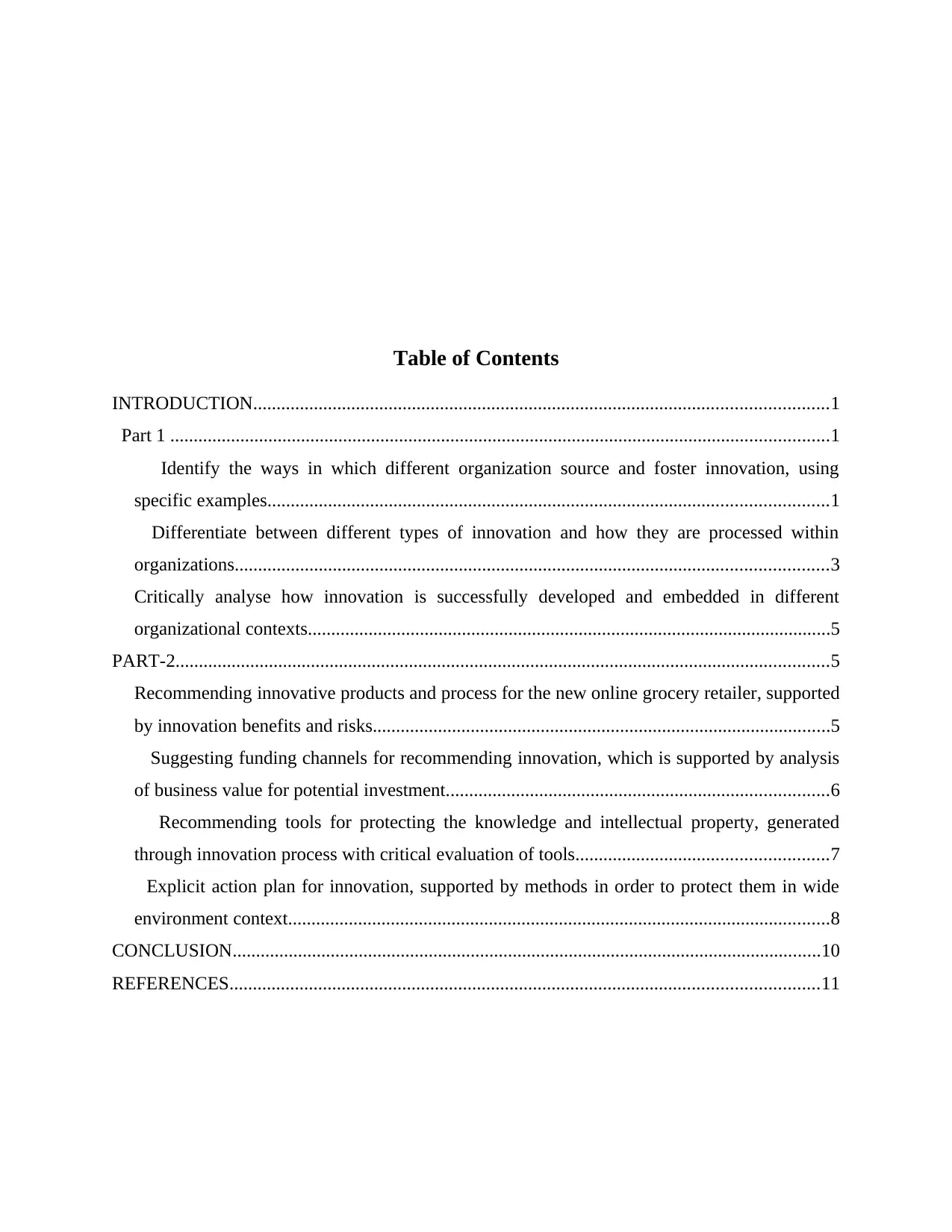
Table of Contents
INTRODUCTION...........................................................................................................................1
Part 1 .............................................................................................................................................1
Identify the ways in which different organization source and foster innovation, using
specific examples........................................................................................................................1
Differentiate between different types of innovation and how they are processed within
organizations...............................................................................................................................3
Critically analyse how innovation is successfully developed and embedded in different
organizational contexts................................................................................................................5
PART-2............................................................................................................................................5
Recommending innovative products and process for the new online grocery retailer, supported
by innovation benefits and risks..................................................................................................5
Suggesting funding channels for recommending innovation, which is supported by analysis
of business value for potential investment..................................................................................6
Recommending tools for protecting the knowledge and intellectual property, generated
through innovation process with critical evaluation of tools......................................................7
Explicit action plan for innovation, supported by methods in order to protect them in wide
environment context....................................................................................................................8
CONCLUSION..............................................................................................................................10
REFERENCES..............................................................................................................................11
INTRODUCTION...........................................................................................................................1
Part 1 .............................................................................................................................................1
Identify the ways in which different organization source and foster innovation, using
specific examples........................................................................................................................1
Differentiate between different types of innovation and how they are processed within
organizations...............................................................................................................................3
Critically analyse how innovation is successfully developed and embedded in different
organizational contexts................................................................................................................5
PART-2............................................................................................................................................5
Recommending innovative products and process for the new online grocery retailer, supported
by innovation benefits and risks..................................................................................................5
Suggesting funding channels for recommending innovation, which is supported by analysis
of business value for potential investment..................................................................................6
Recommending tools for protecting the knowledge and intellectual property, generated
through innovation process with critical evaluation of tools......................................................7
Explicit action plan for innovation, supported by methods in order to protect them in wide
environment context....................................................................................................................8
CONCLUSION..............................................................................................................................10
REFERENCES..............................................................................................................................11
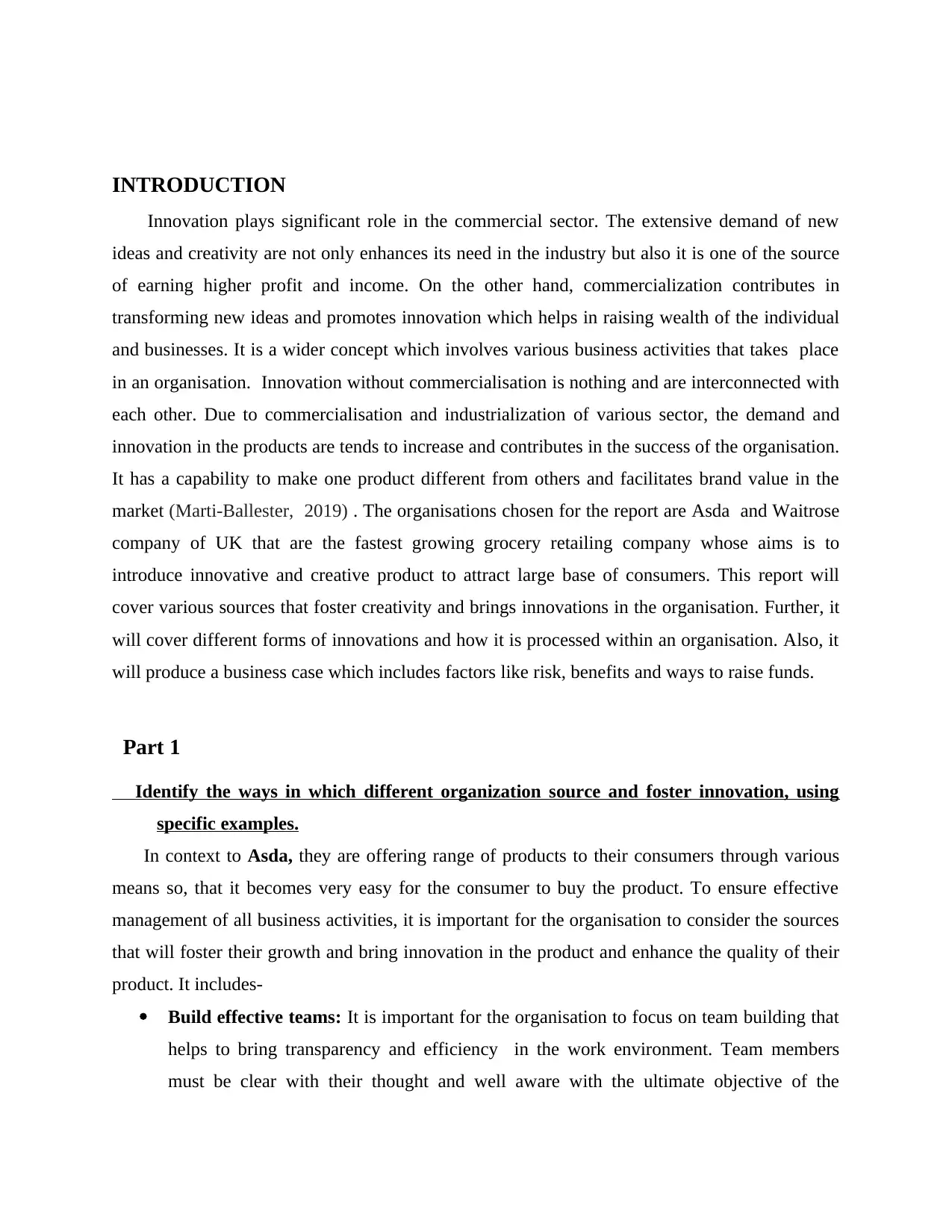
INTRODUCTION
Innovation plays significant role in the commercial sector. The extensive demand of new
ideas and creativity are not only enhances its need in the industry but also it is one of the source
of earning higher profit and income. On the other hand, commercialization contributes in
transforming new ideas and promotes innovation which helps in raising wealth of the individual
and businesses. It is a wider concept which involves various business activities that takes place
in an organisation. Innovation without commercialisation is nothing and are interconnected with
each other. Due to commercialisation and industrialization of various sector, the demand and
innovation in the products are tends to increase and contributes in the success of the organisation.
It has a capability to make one product different from others and facilitates brand value in the
market (Marti‐Ballester, 2019) . The organisations chosen for the report are Asda and Waitrose
company of UK that are the fastest growing grocery retailing company whose aims is to
introduce innovative and creative product to attract large base of consumers. This report will
cover various sources that foster creativity and brings innovations in the organisation. Further, it
will cover different forms of innovations and how it is processed within an organisation. Also, it
will produce a business case which includes factors like risk, benefits and ways to raise funds.
Part 1
Identify the ways in which different organization source and foster innovation, using
specific examples.
In context to Asda, they are offering range of products to their consumers through various
means so, that it becomes very easy for the consumer to buy the product. To ensure effective
management of all business activities, it is important for the organisation to consider the sources
that will foster their growth and bring innovation in the product and enhance the quality of their
product. It includes-
Build effective teams: It is important for the organisation to focus on team building that
helps to bring transparency and efficiency in the work environment. Team members
must be clear with their thought and well aware with the ultimate objective of the
Innovation plays significant role in the commercial sector. The extensive demand of new
ideas and creativity are not only enhances its need in the industry but also it is one of the source
of earning higher profit and income. On the other hand, commercialization contributes in
transforming new ideas and promotes innovation which helps in raising wealth of the individual
and businesses. It is a wider concept which involves various business activities that takes place
in an organisation. Innovation without commercialisation is nothing and are interconnected with
each other. Due to commercialisation and industrialization of various sector, the demand and
innovation in the products are tends to increase and contributes in the success of the organisation.
It has a capability to make one product different from others and facilitates brand value in the
market (Marti‐Ballester, 2019) . The organisations chosen for the report are Asda and Waitrose
company of UK that are the fastest growing grocery retailing company whose aims is to
introduce innovative and creative product to attract large base of consumers. This report will
cover various sources that foster creativity and brings innovations in the organisation. Further, it
will cover different forms of innovations and how it is processed within an organisation. Also, it
will produce a business case which includes factors like risk, benefits and ways to raise funds.
Part 1
Identify the ways in which different organization source and foster innovation, using
specific examples.
In context to Asda, they are offering range of products to their consumers through various
means so, that it becomes very easy for the consumer to buy the product. To ensure effective
management of all business activities, it is important for the organisation to consider the sources
that will foster their growth and bring innovation in the product and enhance the quality of their
product. It includes-
Build effective teams: It is important for the organisation to focus on team building that
helps to bring transparency and efficiency in the work environment. Team members
must be clear with their thought and well aware with the ultimate objective of the
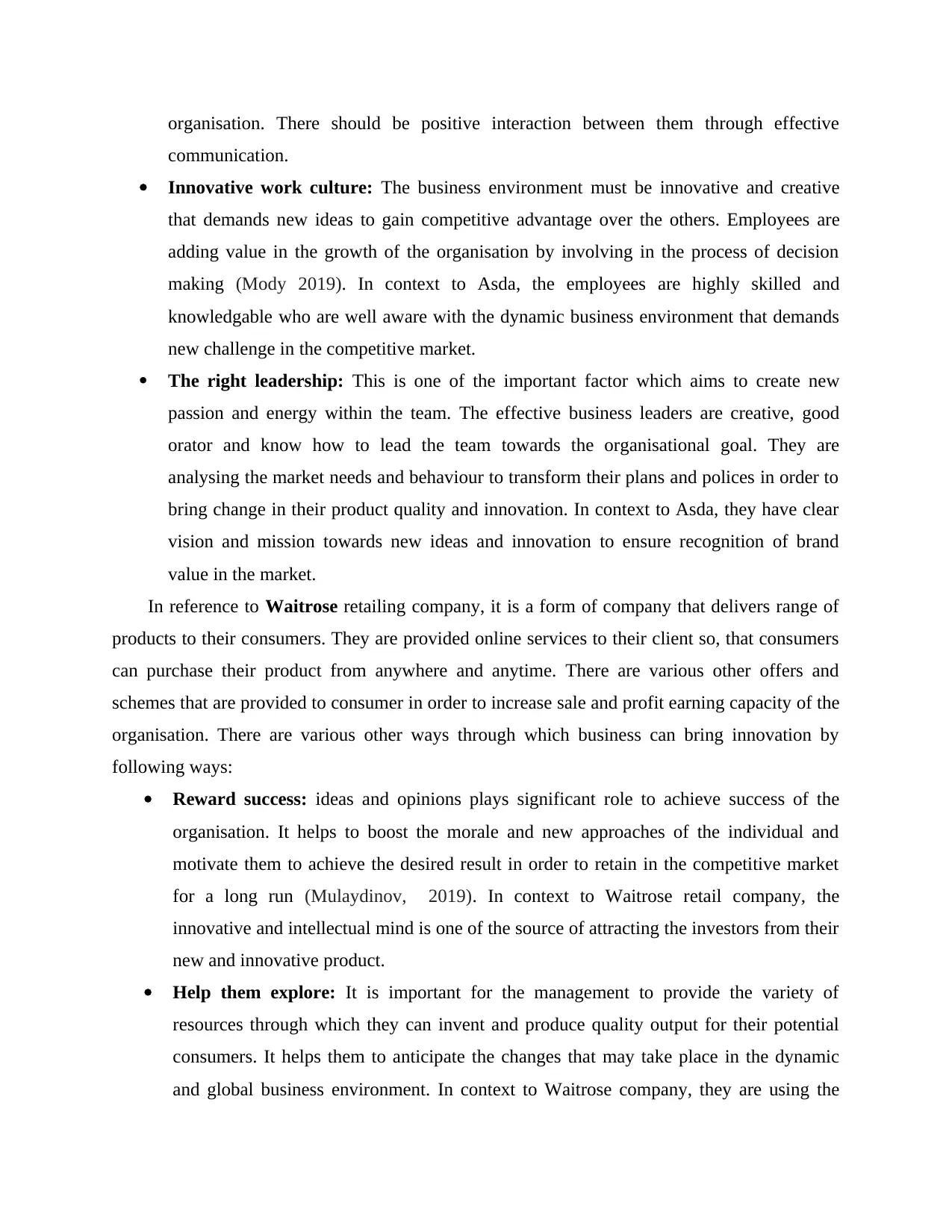
organisation. There should be positive interaction between them through effective
communication.
Innovative work culture: The business environment must be innovative and creative
that demands new ideas to gain competitive advantage over the others. Employees are
adding value in the growth of the organisation by involving in the process of decision
making (Mody 2019). In context to Asda, the employees are highly skilled and
knowledgable who are well aware with the dynamic business environment that demands
new challenge in the competitive market.
The right leadership: This is one of the important factor which aims to create new
passion and energy within the team. The effective business leaders are creative, good
orator and know how to lead the team towards the organisational goal. They are
analysing the market needs and behaviour to transform their plans and polices in order to
bring change in their product quality and innovation. In context to Asda, they have clear
vision and mission towards new ideas and innovation to ensure recognition of brand
value in the market.
In reference to Waitrose retailing company, it is a form of company that delivers range of
products to their consumers. They are provided online services to their client so, that consumers
can purchase their product from anywhere and anytime. There are various other offers and
schemes that are provided to consumer in order to increase sale and profit earning capacity of the
organisation. There are various other ways through which business can bring innovation by
following ways:
Reward success: ideas and opinions plays significant role to achieve success of the
organisation. It helps to boost the morale and new approaches of the individual and
motivate them to achieve the desired result in order to retain in the competitive market
for a long run (Mulaydinov, 2019). In context to Waitrose retail company, the
innovative and intellectual mind is one of the source of attracting the investors from their
new and innovative product.
Help them explore: It is important for the management to provide the variety of
resources through which they can invent and produce quality output for their potential
consumers. It helps them to anticipate the changes that may take place in the dynamic
and global business environment. In context to Waitrose company, they are using the
communication.
Innovative work culture: The business environment must be innovative and creative
that demands new ideas to gain competitive advantage over the others. Employees are
adding value in the growth of the organisation by involving in the process of decision
making (Mody 2019). In context to Asda, the employees are highly skilled and
knowledgable who are well aware with the dynamic business environment that demands
new challenge in the competitive market.
The right leadership: This is one of the important factor which aims to create new
passion and energy within the team. The effective business leaders are creative, good
orator and know how to lead the team towards the organisational goal. They are
analysing the market needs and behaviour to transform their plans and polices in order to
bring change in their product quality and innovation. In context to Asda, they have clear
vision and mission towards new ideas and innovation to ensure recognition of brand
value in the market.
In reference to Waitrose retailing company, it is a form of company that delivers range of
products to their consumers. They are provided online services to their client so, that consumers
can purchase their product from anywhere and anytime. There are various other offers and
schemes that are provided to consumer in order to increase sale and profit earning capacity of the
organisation. There are various other ways through which business can bring innovation by
following ways:
Reward success: ideas and opinions plays significant role to achieve success of the
organisation. It helps to boost the morale and new approaches of the individual and
motivate them to achieve the desired result in order to retain in the competitive market
for a long run (Mulaydinov, 2019). In context to Waitrose retail company, the
innovative and intellectual mind is one of the source of attracting the investors from their
new and innovative product.
Help them explore: It is important for the management to provide the variety of
resources through which they can invent and produce quality output for their potential
consumers. It helps them to anticipate the changes that may take place in the dynamic
and global business environment. In context to Waitrose company, they are using the
Secure Best Marks with AI Grader
Need help grading? Try our AI Grader for instant feedback on your assignments.
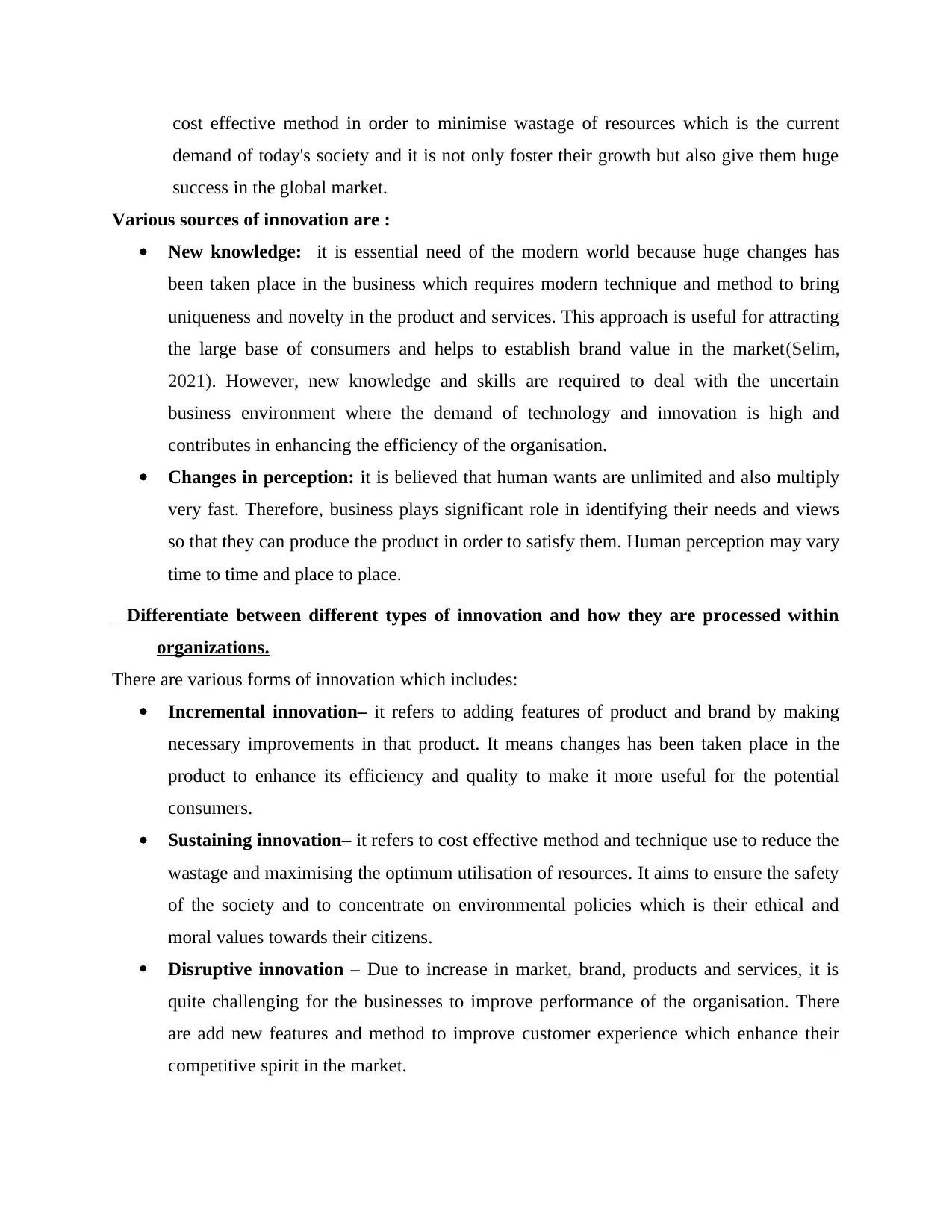
cost effective method in order to minimise wastage of resources which is the current
demand of today's society and it is not only foster their growth but also give them huge
success in the global market.
Various sources of innovation are :
New knowledge: it is essential need of the modern world because huge changes has
been taken place in the business which requires modern technique and method to bring
uniqueness and novelty in the product and services. This approach is useful for attracting
the large base of consumers and helps to establish brand value in the market(Selim,
2021). However, new knowledge and skills are required to deal with the uncertain
business environment where the demand of technology and innovation is high and
contributes in enhancing the efficiency of the organisation.
Changes in perception: it is believed that human wants are unlimited and also multiply
very fast. Therefore, business plays significant role in identifying their needs and views
so that they can produce the product in order to satisfy them. Human perception may vary
time to time and place to place.
Differentiate between different types of innovation and how they are processed within
organizations.
There are various forms of innovation which includes:
Incremental innovation– it refers to adding features of product and brand by making
necessary improvements in that product. It means changes has been taken place in the
product to enhance its efficiency and quality to make it more useful for the potential
consumers.
Sustaining innovation– it refers to cost effective method and technique use to reduce the
wastage and maximising the optimum utilisation of resources. It aims to ensure the safety
of the society and to concentrate on environmental policies which is their ethical and
moral values towards their citizens.
Disruptive innovation – Due to increase in market, brand, products and services, it is
quite challenging for the businesses to improve performance of the organisation. There
are add new features and method to improve customer experience which enhance their
competitive spirit in the market.
demand of today's society and it is not only foster their growth but also give them huge
success in the global market.
Various sources of innovation are :
New knowledge: it is essential need of the modern world because huge changes has
been taken place in the business which requires modern technique and method to bring
uniqueness and novelty in the product and services. This approach is useful for attracting
the large base of consumers and helps to establish brand value in the market(Selim,
2021). However, new knowledge and skills are required to deal with the uncertain
business environment where the demand of technology and innovation is high and
contributes in enhancing the efficiency of the organisation.
Changes in perception: it is believed that human wants are unlimited and also multiply
very fast. Therefore, business plays significant role in identifying their needs and views
so that they can produce the product in order to satisfy them. Human perception may vary
time to time and place to place.
Differentiate between different types of innovation and how they are processed within
organizations.
There are various forms of innovation which includes:
Incremental innovation– it refers to adding features of product and brand by making
necessary improvements in that product. It means changes has been taken place in the
product to enhance its efficiency and quality to make it more useful for the potential
consumers.
Sustaining innovation– it refers to cost effective method and technique use to reduce the
wastage and maximising the optimum utilisation of resources. It aims to ensure the safety
of the society and to concentrate on environmental policies which is their ethical and
moral values towards their citizens.
Disruptive innovation – Due to increase in market, brand, products and services, it is
quite challenging for the businesses to improve performance of the organisation. There
are add new features and method to improve customer experience which enhance their
competitive spirit in the market.
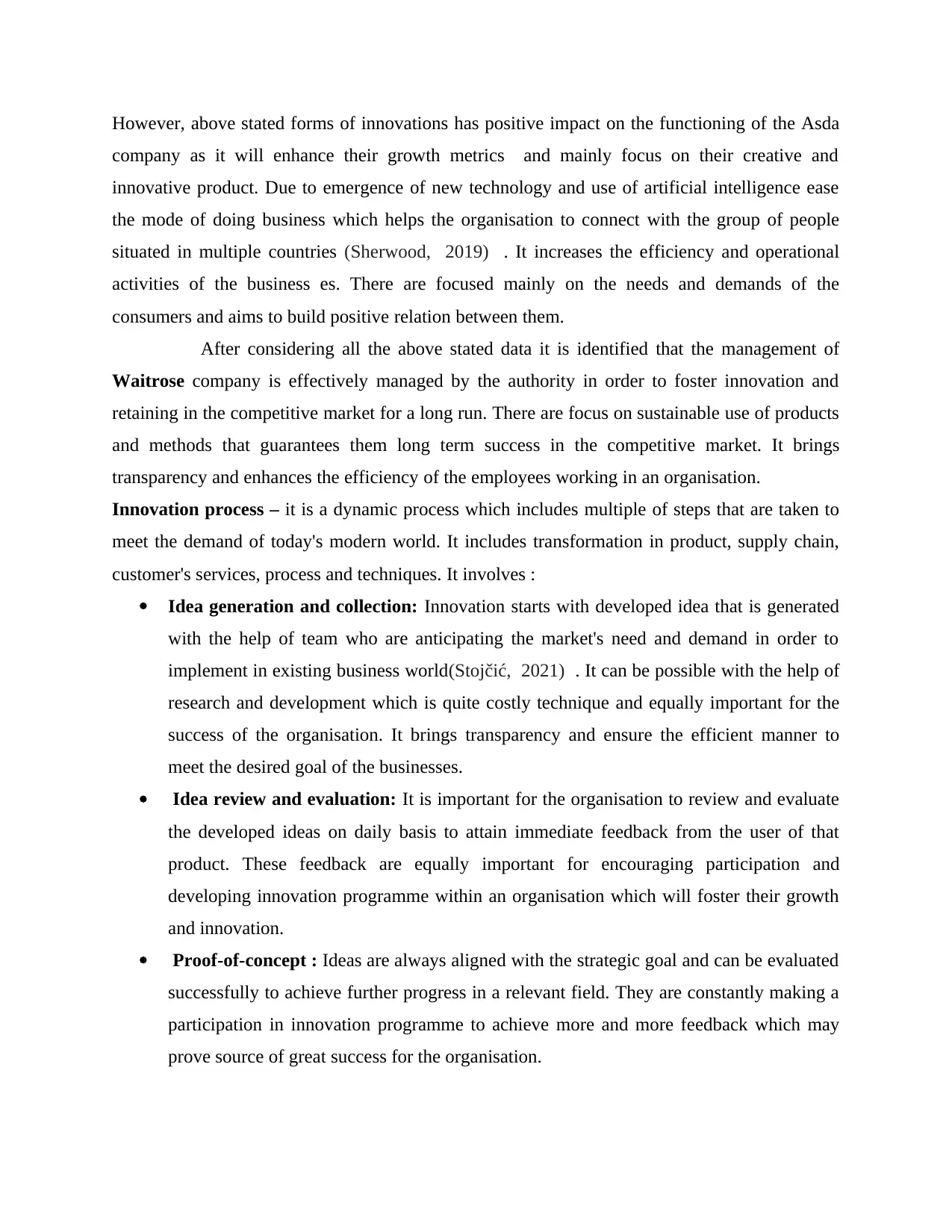
However, above stated forms of innovations has positive impact on the functioning of the Asda
company as it will enhance their growth metrics and mainly focus on their creative and
innovative product. Due to emergence of new technology and use of artificial intelligence ease
the mode of doing business which helps the organisation to connect with the group of people
situated in multiple countries (Sherwood, 2019) . It increases the efficiency and operational
activities of the business es. There are focused mainly on the needs and demands of the
consumers and aims to build positive relation between them.
After considering all the above stated data it is identified that the management of
Waitrose company is effectively managed by the authority in order to foster innovation and
retaining in the competitive market for a long run. There are focus on sustainable use of products
and methods that guarantees them long term success in the competitive market. It brings
transparency and enhances the efficiency of the employees working in an organisation.
Innovation process – it is a dynamic process which includes multiple of steps that are taken to
meet the demand of today's modern world. It includes transformation in product, supply chain,
customer's services, process and techniques. It involves :
Idea generation and collection: Innovation starts with developed idea that is generated
with the help of team who are anticipating the market's need and demand in order to
implement in existing business world(Stojčić, 2021) . It can be possible with the help of
research and development which is quite costly technique and equally important for the
success of the organisation. It brings transparency and ensure the efficient manner to
meet the desired goal of the businesses.
Idea review and evaluation: It is important for the organisation to review and evaluate
the developed ideas on daily basis to attain immediate feedback from the user of that
product. These feedback are equally important for encouraging participation and
developing innovation programme within an organisation which will foster their growth
and innovation.
Proof-of-concept : Ideas are always aligned with the strategic goal and can be evaluated
successfully to achieve further progress in a relevant field. They are constantly making a
participation in innovation programme to achieve more and more feedback which may
prove source of great success for the organisation.
company as it will enhance their growth metrics and mainly focus on their creative and
innovative product. Due to emergence of new technology and use of artificial intelligence ease
the mode of doing business which helps the organisation to connect with the group of people
situated in multiple countries (Sherwood, 2019) . It increases the efficiency and operational
activities of the business es. There are focused mainly on the needs and demands of the
consumers and aims to build positive relation between them.
After considering all the above stated data it is identified that the management of
Waitrose company is effectively managed by the authority in order to foster innovation and
retaining in the competitive market for a long run. There are focus on sustainable use of products
and methods that guarantees them long term success in the competitive market. It brings
transparency and enhances the efficiency of the employees working in an organisation.
Innovation process – it is a dynamic process which includes multiple of steps that are taken to
meet the demand of today's modern world. It includes transformation in product, supply chain,
customer's services, process and techniques. It involves :
Idea generation and collection: Innovation starts with developed idea that is generated
with the help of team who are anticipating the market's need and demand in order to
implement in existing business world(Stojčić, 2021) . It can be possible with the help of
research and development which is quite costly technique and equally important for the
success of the organisation. It brings transparency and ensure the efficient manner to
meet the desired goal of the businesses.
Idea review and evaluation: It is important for the organisation to review and evaluate
the developed ideas on daily basis to attain immediate feedback from the user of that
product. These feedback are equally important for encouraging participation and
developing innovation programme within an organisation which will foster their growth
and innovation.
Proof-of-concept : Ideas are always aligned with the strategic goal and can be evaluated
successfully to achieve further progress in a relevant field. They are constantly making a
participation in innovation programme to achieve more and more feedback which may
prove source of great success for the organisation.
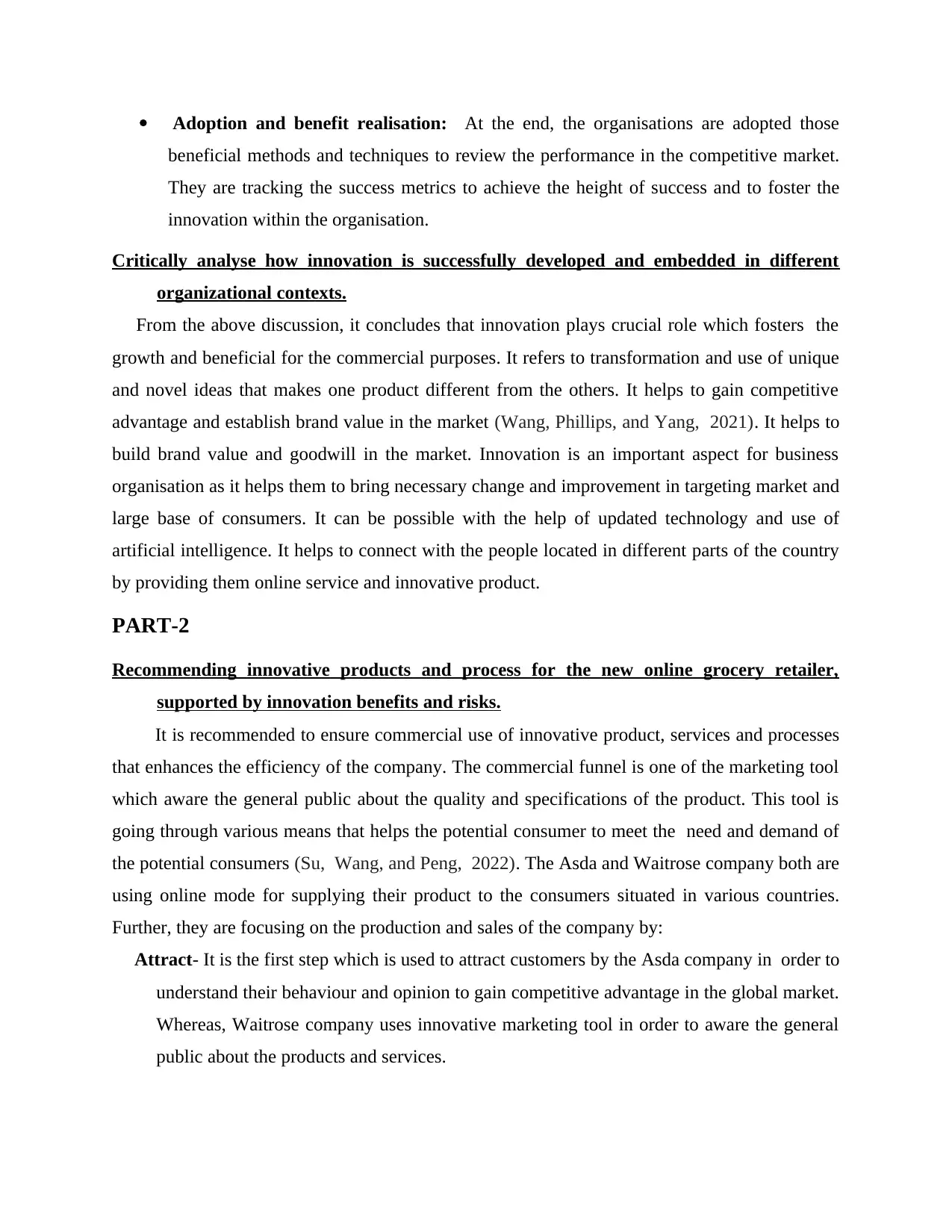
Adoption and benefit realisation: At the end, the organisations are adopted those
beneficial methods and techniques to review the performance in the competitive market.
They are tracking the success metrics to achieve the height of success and to foster the
innovation within the organisation.
Critically analyse how innovation is successfully developed and embedded in different
organizational contexts.
From the above discussion, it concludes that innovation plays crucial role which fosters the
growth and beneficial for the commercial purposes. It refers to transformation and use of unique
and novel ideas that makes one product different from the others. It helps to gain competitive
advantage and establish brand value in the market (Wang, Phillips, and Yang, 2021). It helps to
build brand value and goodwill in the market. Innovation is an important aspect for business
organisation as it helps them to bring necessary change and improvement in targeting market and
large base of consumers. It can be possible with the help of updated technology and use of
artificial intelligence. It helps to connect with the people located in different parts of the country
by providing them online service and innovative product.
PART-2
Recommending innovative products and process for the new online grocery retailer,
supported by innovation benefits and risks.
It is recommended to ensure commercial use of innovative product, services and processes
that enhances the efficiency of the company. The commercial funnel is one of the marketing tool
which aware the general public about the quality and specifications of the product. This tool is
going through various means that helps the potential consumer to meet the need and demand of
the potential consumers (Su, Wang, and Peng, 2022). The Asda and Waitrose company both are
using online mode for supplying their product to the consumers situated in various countries.
Further, they are focusing on the production and sales of the company by:
Attract- It is the first step which is used to attract customers by the Asda company in order to
understand their behaviour and opinion to gain competitive advantage in the global market.
Whereas, Waitrose company uses innovative marketing tool in order to aware the general
public about the products and services.
beneficial methods and techniques to review the performance in the competitive market.
They are tracking the success metrics to achieve the height of success and to foster the
innovation within the organisation.
Critically analyse how innovation is successfully developed and embedded in different
organizational contexts.
From the above discussion, it concludes that innovation plays crucial role which fosters the
growth and beneficial for the commercial purposes. It refers to transformation and use of unique
and novel ideas that makes one product different from the others. It helps to gain competitive
advantage and establish brand value in the market (Wang, Phillips, and Yang, 2021). It helps to
build brand value and goodwill in the market. Innovation is an important aspect for business
organisation as it helps them to bring necessary change and improvement in targeting market and
large base of consumers. It can be possible with the help of updated technology and use of
artificial intelligence. It helps to connect with the people located in different parts of the country
by providing them online service and innovative product.
PART-2
Recommending innovative products and process for the new online grocery retailer,
supported by innovation benefits and risks.
It is recommended to ensure commercial use of innovative product, services and processes
that enhances the efficiency of the company. The commercial funnel is one of the marketing tool
which aware the general public about the quality and specifications of the product. This tool is
going through various means that helps the potential consumer to meet the need and demand of
the potential consumers (Su, Wang, and Peng, 2022). The Asda and Waitrose company both are
using online mode for supplying their product to the consumers situated in various countries.
Further, they are focusing on the production and sales of the company by:
Attract- It is the first step which is used to attract customers by the Asda company in order to
understand their behaviour and opinion to gain competitive advantage in the global market.
Whereas, Waitrose company uses innovative marketing tool in order to aware the general
public about the products and services.
Paraphrase This Document
Need a fresh take? Get an instant paraphrase of this document with our AI Paraphraser
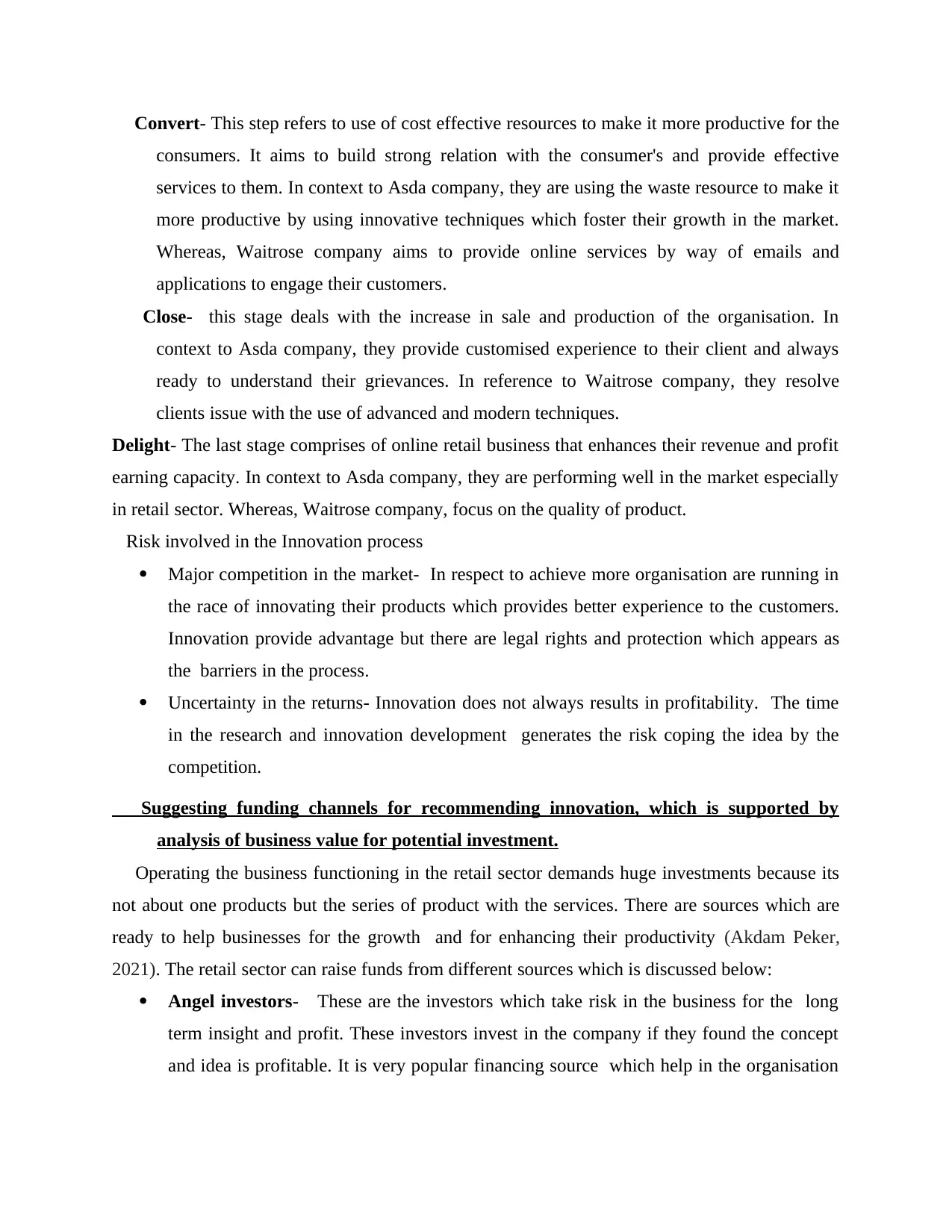
Convert- This step refers to use of cost effective resources to make it more productive for the
consumers. It aims to build strong relation with the consumer's and provide effective
services to them. In context to Asda company, they are using the waste resource to make it
more productive by using innovative techniques which foster their growth in the market.
Whereas, Waitrose company aims to provide online services by way of emails and
applications to engage their customers.
Close- this stage deals with the increase in sale and production of the organisation. In
context to Asda company, they provide customised experience to their client and always
ready to understand their grievances. In reference to Waitrose company, they resolve
clients issue with the use of advanced and modern techniques.
Delight- The last stage comprises of online retail business that enhances their revenue and profit
earning capacity. In context to Asda company, they are performing well in the market especially
in retail sector. Whereas, Waitrose company, focus on the quality of product.
Risk involved in the Innovation process
Major competition in the market- In respect to achieve more organisation are running in
the race of innovating their products which provides better experience to the customers.
Innovation provide advantage but there are legal rights and protection which appears as
the barriers in the process.
Uncertainty in the returns- Innovation does not always results in profitability. The time
in the research and innovation development generates the risk coping the idea by the
competition.
Suggesting funding channels for recommending innovation, which is supported by
analysis of business value for potential investment.
Operating the business functioning in the retail sector demands huge investments because its
not about one products but the series of product with the services. There are sources which are
ready to help businesses for the growth and for enhancing their productivity (Akdam Peker,
2021). The retail sector can raise funds from different sources which is discussed below:
Angel investors- These are the investors which take risk in the business for the long
term insight and profit. These investors invest in the company if they found the concept
and idea is profitable. It is very popular financing source which help in the organisation
consumers. It aims to build strong relation with the consumer's and provide effective
services to them. In context to Asda company, they are using the waste resource to make it
more productive by using innovative techniques which foster their growth in the market.
Whereas, Waitrose company aims to provide online services by way of emails and
applications to engage their customers.
Close- this stage deals with the increase in sale and production of the organisation. In
context to Asda company, they provide customised experience to their client and always
ready to understand their grievances. In reference to Waitrose company, they resolve
clients issue with the use of advanced and modern techniques.
Delight- The last stage comprises of online retail business that enhances their revenue and profit
earning capacity. In context to Asda company, they are performing well in the market especially
in retail sector. Whereas, Waitrose company, focus on the quality of product.
Risk involved in the Innovation process
Major competition in the market- In respect to achieve more organisation are running in
the race of innovating their products which provides better experience to the customers.
Innovation provide advantage but there are legal rights and protection which appears as
the barriers in the process.
Uncertainty in the returns- Innovation does not always results in profitability. The time
in the research and innovation development generates the risk coping the idea by the
competition.
Suggesting funding channels for recommending innovation, which is supported by
analysis of business value for potential investment.
Operating the business functioning in the retail sector demands huge investments because its
not about one products but the series of product with the services. There are sources which are
ready to help businesses for the growth and for enhancing their productivity (Akdam Peker,
2021). The retail sector can raise funds from different sources which is discussed below:
Angel investors- These are the investors which take risk in the business for the long
term insight and profit. These investors invest in the company if they found the concept
and idea is profitable. It is very popular financing source which help in the organisation
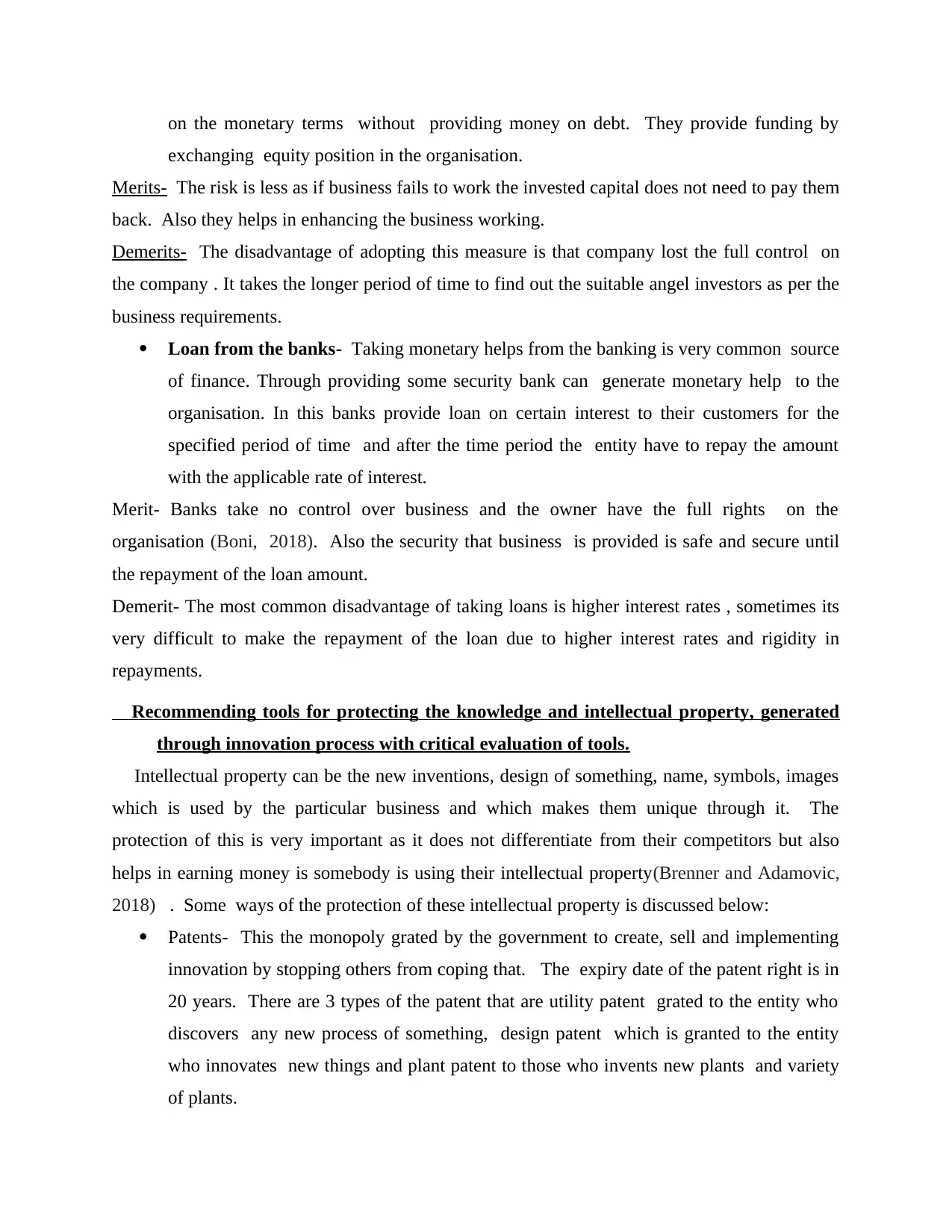
on the monetary terms without providing money on debt. They provide funding by
exchanging equity position in the organisation.
Merits- The risk is less as if business fails to work the invested capital does not need to pay them
back. Also they helps in enhancing the business working.
Demerits- The disadvantage of adopting this measure is that company lost the full control on
the company . It takes the longer period of time to find out the suitable angel investors as per the
business requirements.
Loan from the banks- Taking monetary helps from the banking is very common source
of finance. Through providing some security bank can generate monetary help to the
organisation. In this banks provide loan on certain interest to their customers for the
specified period of time and after the time period the entity have to repay the amount
with the applicable rate of interest.
Merit- Banks take no control over business and the owner have the full rights on the
organisation (Boni, 2018). Also the security that business is provided is safe and secure until
the repayment of the loan amount.
Demerit- The most common disadvantage of taking loans is higher interest rates , sometimes its
very difficult to make the repayment of the loan due to higher interest rates and rigidity in
repayments.
Recommending tools for protecting the knowledge and intellectual property, generated
through innovation process with critical evaluation of tools.
Intellectual property can be the new inventions, design of something, name, symbols, images
which is used by the particular business and which makes them unique through it. The
protection of this is very important as it does not differentiate from their competitors but also
helps in earning money is somebody is using their intellectual property(Brenner and Adamovic,
2018) . Some ways of the protection of these intellectual property is discussed below:
Patents- This the monopoly grated by the government to create, sell and implementing
innovation by stopping others from coping that. The expiry date of the patent right is in
20 years. There are 3 types of the patent that are utility patent grated to the entity who
discovers any new process of something, design patent which is granted to the entity
who innovates new things and plant patent to those who invents new plants and variety
of plants.
exchanging equity position in the organisation.
Merits- The risk is less as if business fails to work the invested capital does not need to pay them
back. Also they helps in enhancing the business working.
Demerits- The disadvantage of adopting this measure is that company lost the full control on
the company . It takes the longer period of time to find out the suitable angel investors as per the
business requirements.
Loan from the banks- Taking monetary helps from the banking is very common source
of finance. Through providing some security bank can generate monetary help to the
organisation. In this banks provide loan on certain interest to their customers for the
specified period of time and after the time period the entity have to repay the amount
with the applicable rate of interest.
Merit- Banks take no control over business and the owner have the full rights on the
organisation (Boni, 2018). Also the security that business is provided is safe and secure until
the repayment of the loan amount.
Demerit- The most common disadvantage of taking loans is higher interest rates , sometimes its
very difficult to make the repayment of the loan due to higher interest rates and rigidity in
repayments.
Recommending tools for protecting the knowledge and intellectual property, generated
through innovation process with critical evaluation of tools.
Intellectual property can be the new inventions, design of something, name, symbols, images
which is used by the particular business and which makes them unique through it. The
protection of this is very important as it does not differentiate from their competitors but also
helps in earning money is somebody is using their intellectual property(Brenner and Adamovic,
2018) . Some ways of the protection of these intellectual property is discussed below:
Patents- This the monopoly grated by the government to create, sell and implementing
innovation by stopping others from coping that. The expiry date of the patent right is in
20 years. There are 3 types of the patent that are utility patent grated to the entity who
discovers any new process of something, design patent which is granted to the entity
who innovates new things and plant patent to those who invents new plants and variety
of plants.
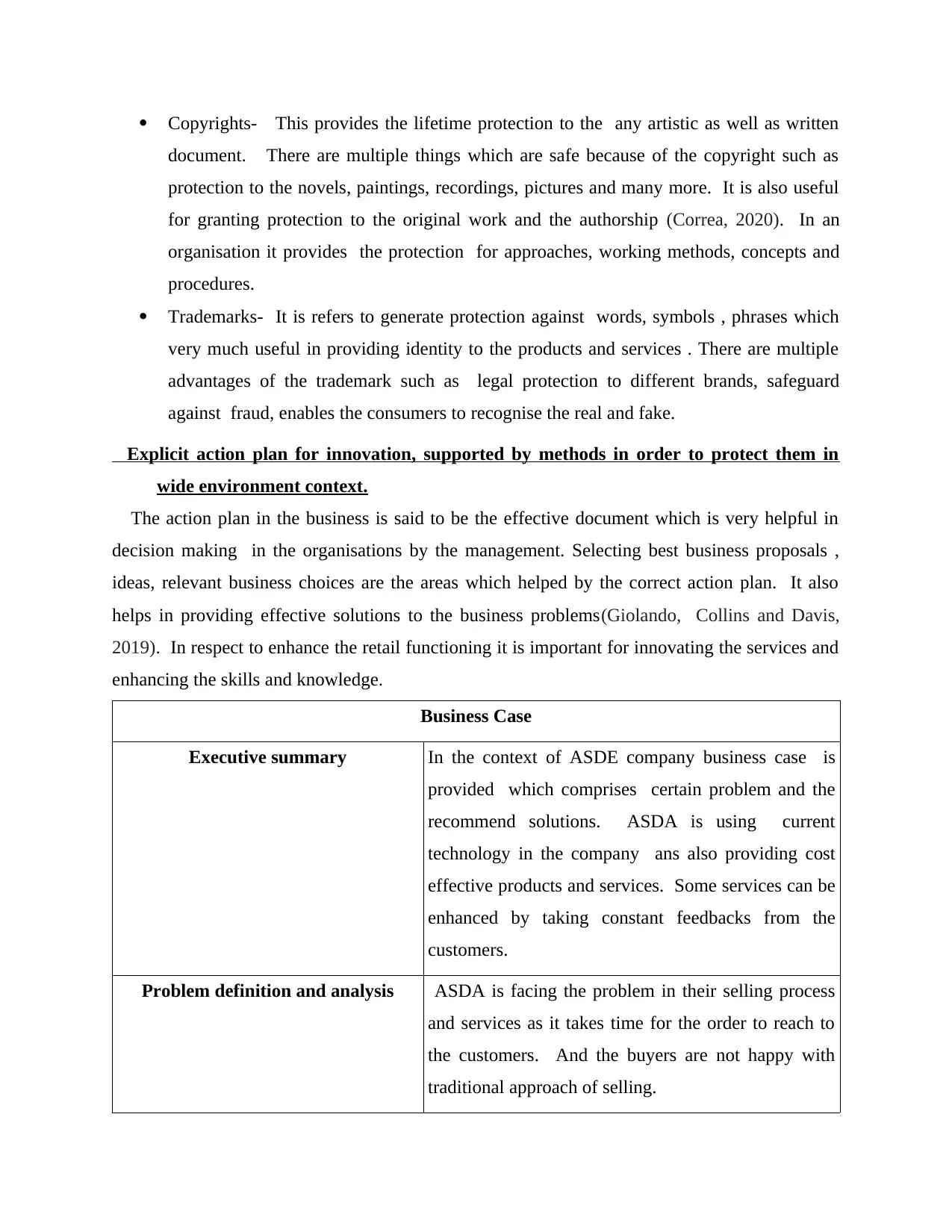
Copyrights- This provides the lifetime protection to the any artistic as well as written
document. There are multiple things which are safe because of the copyright such as
protection to the novels, paintings, recordings, pictures and many more. It is also useful
for granting protection to the original work and the authorship (Correa, 2020). In an
organisation it provides the protection for approaches, working methods, concepts and
procedures.
Trademarks- It is refers to generate protection against words, symbols , phrases which
very much useful in providing identity to the products and services . There are multiple
advantages of the trademark such as legal protection to different brands, safeguard
against fraud, enables the consumers to recognise the real and fake.
Explicit action plan for innovation, supported by methods in order to protect them in
wide environment context.
The action plan in the business is said to be the effective document which is very helpful in
decision making in the organisations by the management. Selecting best business proposals ,
ideas, relevant business choices are the areas which helped by the correct action plan. It also
helps in providing effective solutions to the business problems(Giolando, Collins and Davis,
2019). In respect to enhance the retail functioning it is important for innovating the services and
enhancing the skills and knowledge.
Business Case
Executive summary In the context of ASDE company business case is
provided which comprises certain problem and the
recommend solutions. ASDA is using current
technology in the company ans also providing cost
effective products and services. Some services can be
enhanced by taking constant feedbacks from the
customers.
Problem definition and analysis ASDA is facing the problem in their selling process
and services as it takes time for the order to reach to
the customers. And the buyers are not happy with
traditional approach of selling.
document. There are multiple things which are safe because of the copyright such as
protection to the novels, paintings, recordings, pictures and many more. It is also useful
for granting protection to the original work and the authorship (Correa, 2020). In an
organisation it provides the protection for approaches, working methods, concepts and
procedures.
Trademarks- It is refers to generate protection against words, symbols , phrases which
very much useful in providing identity to the products and services . There are multiple
advantages of the trademark such as legal protection to different brands, safeguard
against fraud, enables the consumers to recognise the real and fake.
Explicit action plan for innovation, supported by methods in order to protect them in
wide environment context.
The action plan in the business is said to be the effective document which is very helpful in
decision making in the organisations by the management. Selecting best business proposals ,
ideas, relevant business choices are the areas which helped by the correct action plan. It also
helps in providing effective solutions to the business problems(Giolando, Collins and Davis,
2019). In respect to enhance the retail functioning it is important for innovating the services and
enhancing the skills and knowledge.
Business Case
Executive summary In the context of ASDE company business case is
provided which comprises certain problem and the
recommend solutions. ASDA is using current
technology in the company ans also providing cost
effective products and services. Some services can be
enhanced by taking constant feedbacks from the
customers.
Problem definition and analysis ASDA is facing the problem in their selling process
and services as it takes time for the order to reach to
the customers. And the buyers are not happy with
traditional approach of selling.
Secure Best Marks with AI Grader
Need help grading? Try our AI Grader for instant feedback on your assignments.
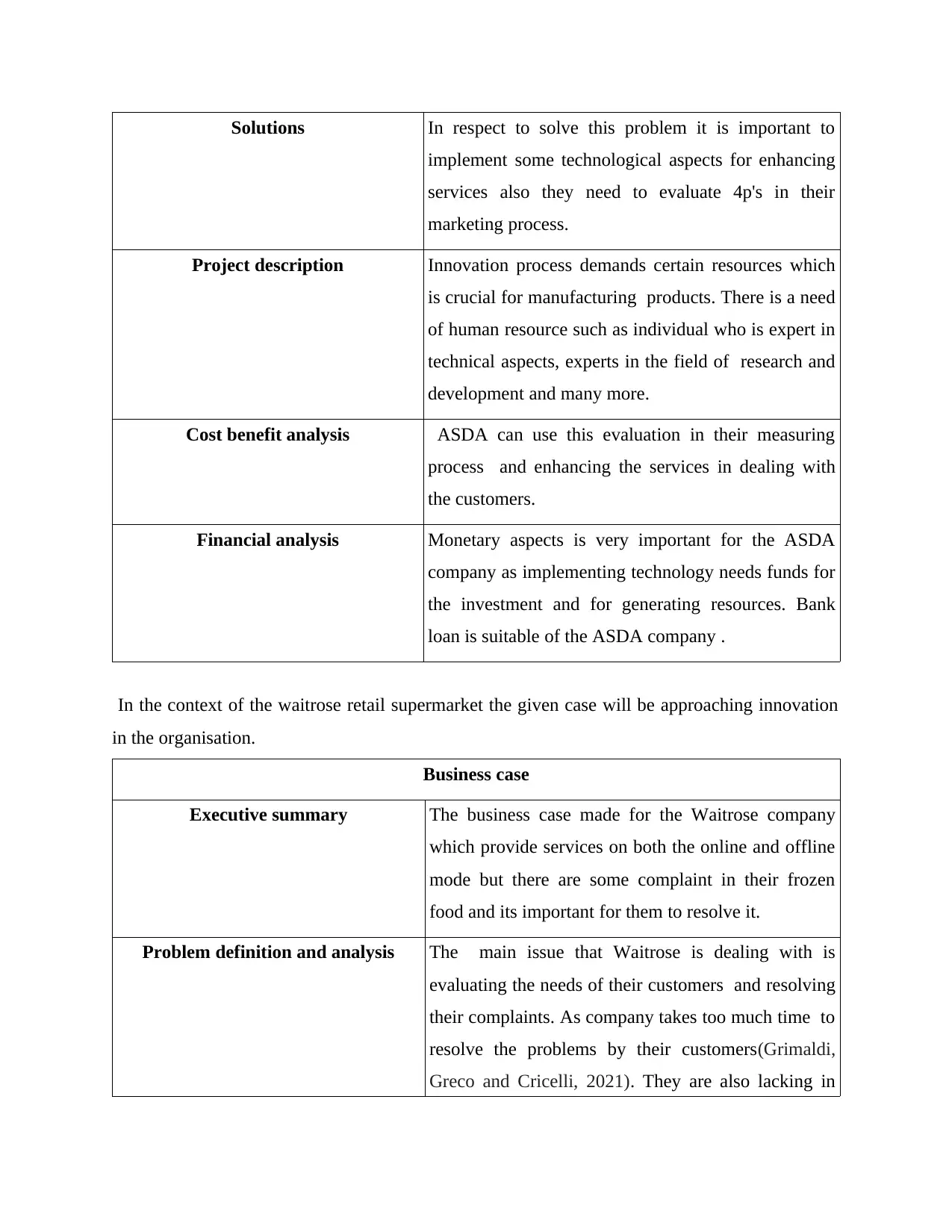
Solutions In respect to solve this problem it is important to
implement some technological aspects for enhancing
services also they need to evaluate 4p's in their
marketing process.
Project description Innovation process demands certain resources which
is crucial for manufacturing products. There is a need
of human resource such as individual who is expert in
technical aspects, experts in the field of research and
development and many more.
Cost benefit analysis ASDA can use this evaluation in their measuring
process and enhancing the services in dealing with
the customers.
Financial analysis Monetary aspects is very important for the ASDA
company as implementing technology needs funds for
the investment and for generating resources. Bank
loan is suitable of the ASDA company .
In the context of the waitrose retail supermarket the given case will be approaching innovation
in the organisation.
Business case
Executive summary The business case made for the Waitrose company
which provide services on both the online and offline
mode but there are some complaint in their frozen
food and its important for them to resolve it.
Problem definition and analysis The main issue that Waitrose is dealing with is
evaluating the needs of their customers and resolving
their complaints. As company takes too much time to
resolve the problems by their customers(Grimaldi,
Greco and Cricelli, 2021). They are also lacking in
implement some technological aspects for enhancing
services also they need to evaluate 4p's in their
marketing process.
Project description Innovation process demands certain resources which
is crucial for manufacturing products. There is a need
of human resource such as individual who is expert in
technical aspects, experts in the field of research and
development and many more.
Cost benefit analysis ASDA can use this evaluation in their measuring
process and enhancing the services in dealing with
the customers.
Financial analysis Monetary aspects is very important for the ASDA
company as implementing technology needs funds for
the investment and for generating resources. Bank
loan is suitable of the ASDA company .
In the context of the waitrose retail supermarket the given case will be approaching innovation
in the organisation.
Business case
Executive summary The business case made for the Waitrose company
which provide services on both the online and offline
mode but there are some complaint in their frozen
food and its important for them to resolve it.
Problem definition and analysis The main issue that Waitrose is dealing with is
evaluating the needs of their customers and resolving
their complaints. As company takes too much time to
resolve the problems by their customers(Grimaldi,
Greco and Cricelli, 2021). They are also lacking in
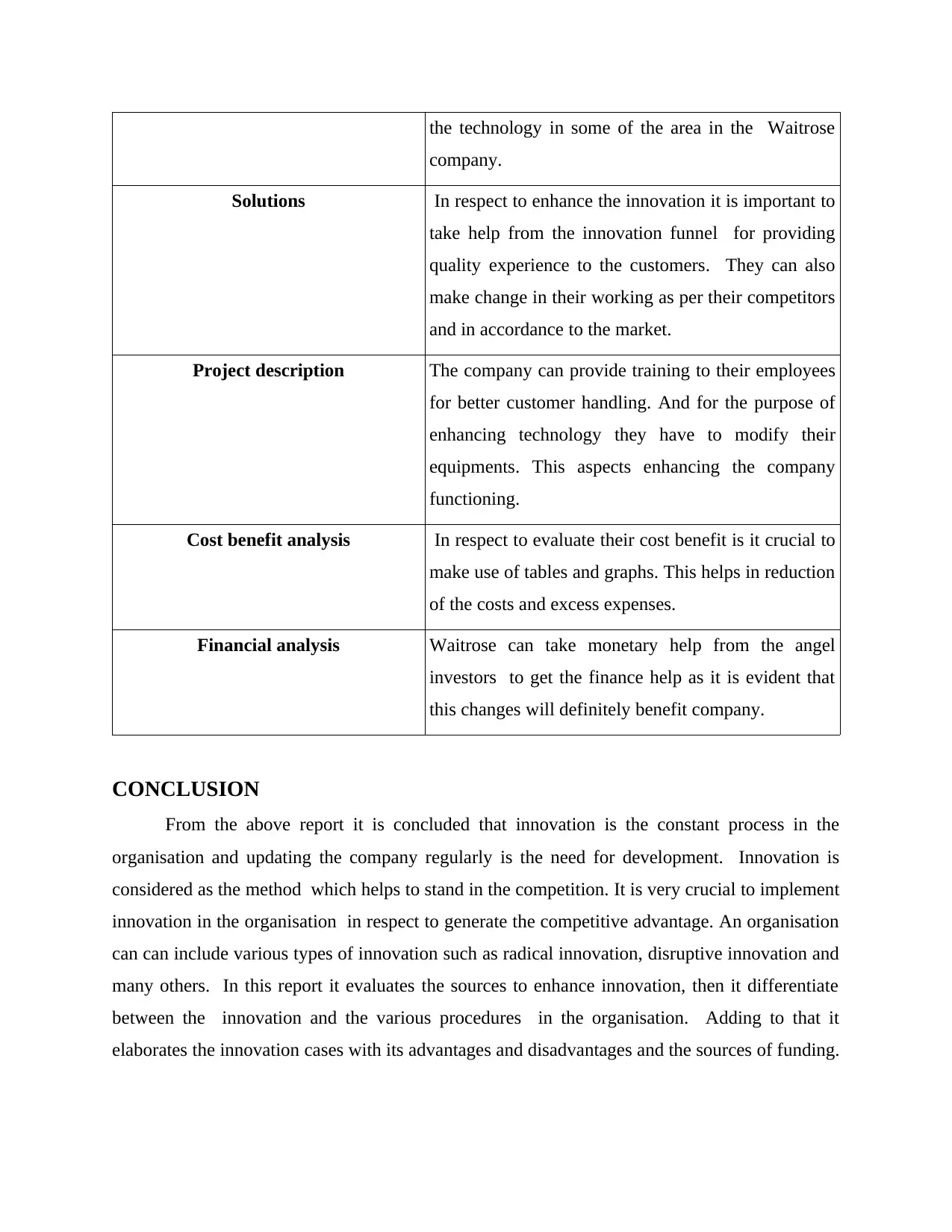
the technology in some of the area in the Waitrose
company.
Solutions In respect to enhance the innovation it is important to
take help from the innovation funnel for providing
quality experience to the customers. They can also
make change in their working as per their competitors
and in accordance to the market.
Project description The company can provide training to their employees
for better customer handling. And for the purpose of
enhancing technology they have to modify their
equipments. This aspects enhancing the company
functioning.
Cost benefit analysis In respect to evaluate their cost benefit is it crucial to
make use of tables and graphs. This helps in reduction
of the costs and excess expenses.
Financial analysis Waitrose can take monetary help from the angel
investors to get the finance help as it is evident that
this changes will definitely benefit company.
CONCLUSION
From the above report it is concluded that innovation is the constant process in the
organisation and updating the company regularly is the need for development. Innovation is
considered as the method which helps to stand in the competition. It is very crucial to implement
innovation in the organisation in respect to generate the competitive advantage. An organisation
can can include various types of innovation such as radical innovation, disruptive innovation and
many others. In this report it evaluates the sources to enhance innovation, then it differentiate
between the innovation and the various procedures in the organisation. Adding to that it
elaborates the innovation cases with its advantages and disadvantages and the sources of funding.
company.
Solutions In respect to enhance the innovation it is important to
take help from the innovation funnel for providing
quality experience to the customers. They can also
make change in their working as per their competitors
and in accordance to the market.
Project description The company can provide training to their employees
for better customer handling. And for the purpose of
enhancing technology they have to modify their
equipments. This aspects enhancing the company
functioning.
Cost benefit analysis In respect to evaluate their cost benefit is it crucial to
make use of tables and graphs. This helps in reduction
of the costs and excess expenses.
Financial analysis Waitrose can take monetary help from the angel
investors to get the finance help as it is evident that
this changes will definitely benefit company.
CONCLUSION
From the above report it is concluded that innovation is the constant process in the
organisation and updating the company regularly is the need for development. Innovation is
considered as the method which helps to stand in the competition. It is very crucial to implement
innovation in the organisation in respect to generate the competitive advantage. An organisation
can can include various types of innovation such as radical innovation, disruptive innovation and
many others. In this report it evaluates the sources to enhance innovation, then it differentiate
between the innovation and the various procedures in the organisation. Adding to that it
elaborates the innovation cases with its advantages and disadvantages and the sources of funding.

Further it explains the intellectual property that are Patents, Copyrights and Trademarks and its
impact on the ASDA and Waitrose company.
impact on the ASDA and Waitrose company.
Paraphrase This Document
Need a fresh take? Get an instant paraphrase of this document with our AI Paraphraser
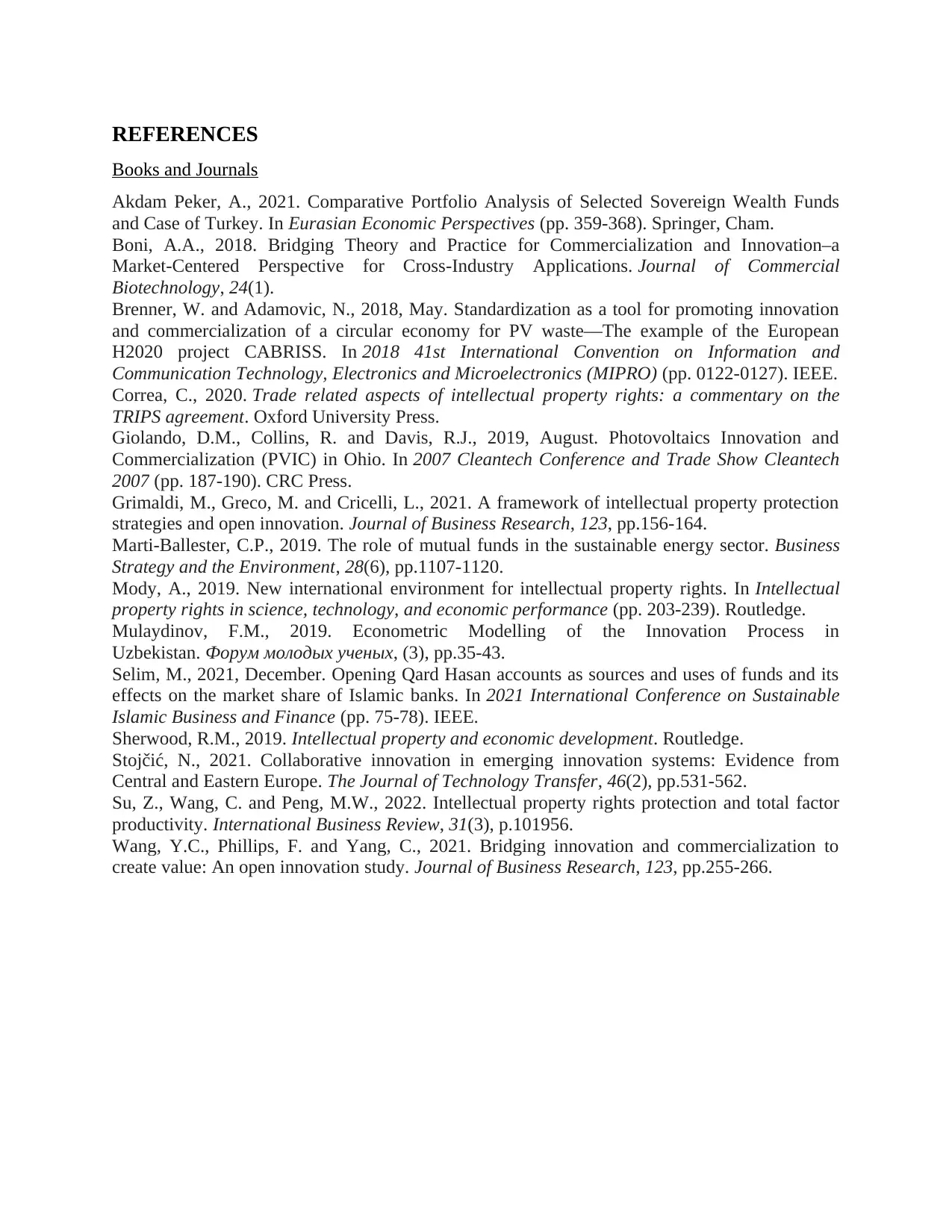
REFERENCES
Books and Journals
Akdam Peker, A., 2021. Comparative Portfolio Analysis of Selected Sovereign Wealth Funds
and Case of Turkey. In Eurasian Economic Perspectives (pp. 359-368). Springer, Cham.
Boni, A.A., 2018. Bridging Theory and Practice for Commercialization and Innovation–a
Market-Centered Perspective for Cross-Industry Applications. Journal of Commercial
Biotechnology, 24(1).
Brenner, W. and Adamovic, N., 2018, May. Standardization as a tool for promoting innovation
and commercialization of a circular economy for PV waste—The example of the European
H2020 project CABRISS. In 2018 41st International Convention on Information and
Communication Technology, Electronics and Microelectronics (MIPRO) (pp. 0122-0127). IEEE.
Correa, C., 2020. Trade related aspects of intellectual property rights: a commentary on the
TRIPS agreement. Oxford University Press.
Giolando, D.M., Collins, R. and Davis, R.J., 2019, August. Photovoltaics Innovation and
Commercialization (PVIC) in Ohio. In 2007 Cleantech Conference and Trade Show Cleantech
2007 (pp. 187-190). CRC Press.
Grimaldi, M., Greco, M. and Cricelli, L., 2021. A framework of intellectual property protection
strategies and open innovation. Journal of Business Research, 123, pp.156-164.
Marti‐Ballester, C.P., 2019. The role of mutual funds in the sustainable energy sector. Business
Strategy and the Environment, 28(6), pp.1107-1120.
Mody, A., 2019. New international environment for intellectual property rights. In Intellectual
property rights in science, technology, and economic performance (pp. 203-239). Routledge.
Mulaydinov, F.M., 2019. Econometric Modelling of the Innovation Process in
Uzbekistan. Форум молодых ученых, (3), pp.35-43.
Selim, M., 2021, December. Opening Qard Hasan accounts as sources and uses of funds and its
effects on the market share of Islamic banks. In 2021 International Conference on Sustainable
Islamic Business and Finance (pp. 75-78). IEEE.
Sherwood, R.M., 2019. Intellectual property and economic development. Routledge.
Stojčić, N., 2021. Collaborative innovation in emerging innovation systems: Evidence from
Central and Eastern Europe. The Journal of Technology Transfer, 46(2), pp.531-562.
Su, Z., Wang, C. and Peng, M.W., 2022. Intellectual property rights protection and total factor
productivity. International Business Review, 31(3), p.101956.
Wang, Y.C., Phillips, F. and Yang, C., 2021. Bridging innovation and commercialization to
create value: An open innovation study. Journal of Business Research, 123, pp.255-266.
Books and Journals
Akdam Peker, A., 2021. Comparative Portfolio Analysis of Selected Sovereign Wealth Funds
and Case of Turkey. In Eurasian Economic Perspectives (pp. 359-368). Springer, Cham.
Boni, A.A., 2018. Bridging Theory and Practice for Commercialization and Innovation–a
Market-Centered Perspective for Cross-Industry Applications. Journal of Commercial
Biotechnology, 24(1).
Brenner, W. and Adamovic, N., 2018, May. Standardization as a tool for promoting innovation
and commercialization of a circular economy for PV waste—The example of the European
H2020 project CABRISS. In 2018 41st International Convention on Information and
Communication Technology, Electronics and Microelectronics (MIPRO) (pp. 0122-0127). IEEE.
Correa, C., 2020. Trade related aspects of intellectual property rights: a commentary on the
TRIPS agreement. Oxford University Press.
Giolando, D.M., Collins, R. and Davis, R.J., 2019, August. Photovoltaics Innovation and
Commercialization (PVIC) in Ohio. In 2007 Cleantech Conference and Trade Show Cleantech
2007 (pp. 187-190). CRC Press.
Grimaldi, M., Greco, M. and Cricelli, L., 2021. A framework of intellectual property protection
strategies and open innovation. Journal of Business Research, 123, pp.156-164.
Marti‐Ballester, C.P., 2019. The role of mutual funds in the sustainable energy sector. Business
Strategy and the Environment, 28(6), pp.1107-1120.
Mody, A., 2019. New international environment for intellectual property rights. In Intellectual
property rights in science, technology, and economic performance (pp. 203-239). Routledge.
Mulaydinov, F.M., 2019. Econometric Modelling of the Innovation Process in
Uzbekistan. Форум молодых ученых, (3), pp.35-43.
Selim, M., 2021, December. Opening Qard Hasan accounts as sources and uses of funds and its
effects on the market share of Islamic banks. In 2021 International Conference on Sustainable
Islamic Business and Finance (pp. 75-78). IEEE.
Sherwood, R.M., 2019. Intellectual property and economic development. Routledge.
Stojčić, N., 2021. Collaborative innovation in emerging innovation systems: Evidence from
Central and Eastern Europe. The Journal of Technology Transfer, 46(2), pp.531-562.
Su, Z., Wang, C. and Peng, M.W., 2022. Intellectual property rights protection and total factor
productivity. International Business Review, 31(3), p.101956.
Wang, Y.C., Phillips, F. and Yang, C., 2021. Bridging innovation and commercialization to
create value: An open innovation study. Journal of Business Research, 123, pp.255-266.
1 out of 14
Related Documents
Your All-in-One AI-Powered Toolkit for Academic Success.
+13062052269
info@desklib.com
Available 24*7 on WhatsApp / Email
![[object Object]](/_next/static/media/star-bottom.7253800d.svg)
Unlock your academic potential
© 2024 | Zucol Services PVT LTD | All rights reserved.



